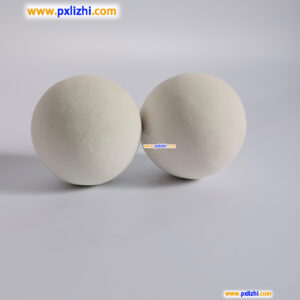
。
# Inert Ceramic Ball Applications in Industrial Processes
## Introduction to Inert Ceramic Balls
Inert ceramic balls are widely used in various industrial processes due to their excellent chemical stability, high mechanical strength, and thermal resistance. These small spherical ceramic pieces play a crucial role in many chemical and petrochemical applications, serving as catalyst supports, tower packing materials, and bed supports in reactors.
## Key Properties of Inert Ceramic Balls
The effectiveness of inert ceramic balls in industrial applications stems from their unique properties:
– High temperature resistance
– Excellent chemical inertness
– Superior mechanical strength
– Low water absorption
– Good thermal shock resistance
## Major Industrial Applications
### 1. Catalyst Support in Chemical Reactors
Inert ceramic balls are commonly used as catalyst supports in fixed-bed reactors. They provide:
– Uniform distribution of catalyst particles
– Improved gas or liquid flow
– Prevention of catalyst particle movement
– Enhanced heat transfer
### 2. Packing Material in Distillation Columns
These ceramic balls serve as efficient packing materials in distillation and absorption towers by:
– Increasing surface area for mass transfer
– Reducing pressure drop
– Improving separation efficiency
– Withstanding corrosive environments
### 3. Bed Support in Industrial Furnaces
In high-temperature furnaces, inert ceramic balls:
– Support catalyst or other packing materials
– Distribute heat evenly
– Protect lower sections from thermal shock
– Maintain structural integrity at extreme temperatures
### 4. Filtration Systems
Their uniform size and chemical resistance make them ideal for:
– Water treatment filtration
– Gas purification systems
– Removal of particulates in process streams
– Acid-resistant filtration applications
## Advantages Over Alternative Materials
Compared to metal or plastic alternatives, inert ceramic balls offer:
– Longer service life in harsh conditions
– Better resistance to corrosion
– Higher temperature tolerance
Keyword: inert ceramic ball
– Lower maintenance requirements
– More consistent performance over time
## Selection Considerations
When choosing inert ceramic balls for industrial applications, consider:
– Operating temperature range
– Chemical environment
– Required mechanical strength
– Size and shape specifications
– Pressure drop requirements
## Conclusion
Inert ceramic balls have become indispensable components in numerous industrial processes. Their unique combination of properties makes them superior to many alternative materials, particularly in harsh operating conditions. As industrial processes continue to evolve, the demand for high-performance inert ceramic balls is expected to grow, driving further innovations in their composition and manufacturing techniques.